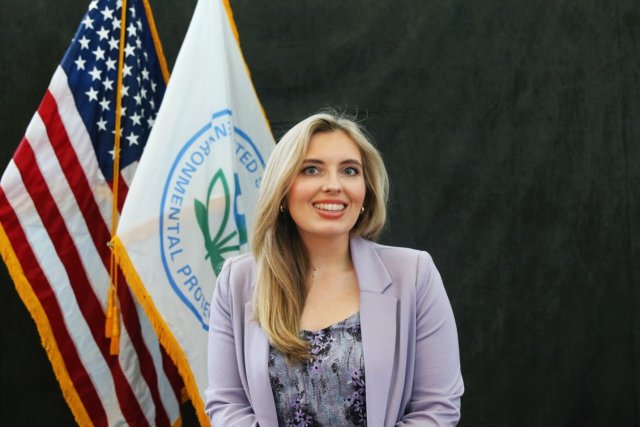Meet EPA Biologist Madison Feshuk

EPA researcher Madison Feshuk is a biologist within the Office of Research and Development. She develops and applies innovative data science solutions for new approach methodologies (NAMs). Her efforts increase chemical data interoperability and accessibility for use in risk assessments and regulatory decision-making.
Tell us about your background.
I earned dual-bachelor degrees (BS in cell and molecular biology/BSPH in public health) as well as a master in public health and tropical medicine from Tulane University in New Orleans, LA. My graduate work focused on infectious disease, mosquito ecology and vector control strategies. At EPA, I provide project management, curation, and analysis support to various projects including: the Toxicity Forecaster (ToxCast) program, a resource for curated vitro screening data, Toxicity Reference Database (ToxRefDB), a resource for legacy animal toxicity data, and ChemTrack, an internal database and application used for chemical-sample tracking. My expertise includes database development and maintenance, data analysis, project management, user acceptance testing, and quality evaluation efforts within the hazard identification and bioactivity space.
When did you first know you wanted to be a scientist?
My middle school fascination with science started after learning about microorganisms, specifically parasitic protists, and their ability to cause disease. I explored this interest by studying cell and molecular biology and public health, learning more about our body’s complex cellular processes and environmental factors predisposing individuals to disease. A programming workshop introduced me post-grad to the possibilities we have in leveraging data, and I’ve been learning and refining my data science skills ever since! I’m grateful now to be working in the environmental science field of computational toxicology, which combines these passions.
What do you like most about your job?
It’s incredible to work with so many skilled, supportive researchers who are passionate about their work and EPA’s mission. Each day brings its new challenges, but we tackle them as we strive to push the frontiers of science.
How does EPA science matter?
EPA needs innovative research to be able to evaluate and prioritize chemicals of concern in an efficient, risk-based context. There are far too many chemicals and chemical combinations to test using traditional animal screening methods. The data we curate (in ToxCast and ToxRefDB for example) builds capacity and confidence in modeling efforts that can be used to predict chemical toxicity and ultimately lead to reductions in animal testing.
If you weren’t a scientist, what would you be doing?
Before discovering CompTox, I had hoped to become an infection preventionist working to identify risks and mitigate disease outbreaks within a health care facility.
What advice would you give a student interested in a career in science?
Stay curious, don’t give up and reach out for help early. Also, be open to different opportunities as they arise, and don’t limit yourself based on any pre-conceived idea of what you want your career to be. Take advantage of your network connections and free online resources.
If you can have any superpower, what would you choose?
Teleportation so I can spend less time traveling and more time enjoying the destination.
What do you think the coolest scientific discovery was and why?
The accidental discovery of saccharin may not be the “coolest”, but it is certainly a memorable one. It’s interesting to think about how laboratory practices have evolved!
Madison's Publications:
Feshuk, M., Kolaczkowski, L., Dunham, K., Davidson-Fritz, S. E., Carstens, K. E., Brown, J., Judson, R. S., & Paul Friedman, K. (2023). The ToxCast pipeline: updates to curve-fitting approaches and database structure. Frontiers in toxicology, 5, 1275980. https://doi.org/10.3389/ftox.2023.1275980
Feshuk, M., L. Kolaczkowski, S. Watford, AND K. Paul-Friedman. ToxRefDB v2.1: update to curated in vivo study data in the Toxicity Reference Database. Frontiers in Toxicology. Frontiers, Lausanne, Switzerland, 5:1260305, (2023). https://doi.org/10.3389/ftox.2023.1260305
Editor's Note: The opinions expressed herein are those of the researcher alone. EPA does not endorse the opinions or positions expressed.
